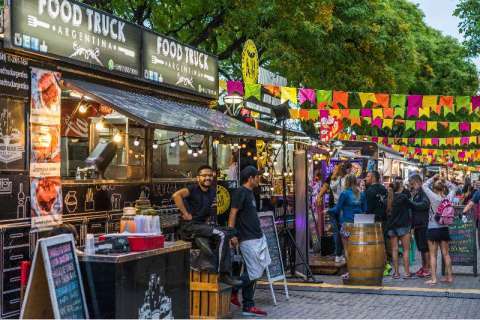Over the past ten years, the popularity of food trucks has grown immensely. Any food lover or casual diner alike enjoys trying the delicious food, yet quick creations that each niche food truck provides.
If the idea of owning a food truck is intriguing to you, that’s great! Just know that like any other food service-based business, there will be many hurdles to overcome to find success. With a little help, you can be on your way to food truck stardom!
Keeping this Guide to Starting a Food Truck Business resource handy as you begin to navigate the murky waters of this niche industry will help you find your footing early on. Without further ado, let’s jump right in!
#1: Conduct Local Industry Research
Before jumping headfirst into the first food truck idea you have, you first need to do a bit of preliminary research to ensure that your idea is suitable for the local scene. When doing your local industry research, try to think through a few common questions:
-
How many food trucks are already in your area?
-
Is there a type of cuisine that is underserved in your area?
-
What type of restaurants are the most popular in your city?
-
How many food festivals could you travel to each year?
-
Does your city support food truck-based businesses?
Taking a step back to view how the industry is supported in your local area should always be the first step you take before starting a business. With the food truck industry, this process should help you shape up your specific business plan.
#2: Settle on a Food Truck Concept
After you do your initial research, you should have some ideas about the type of food truck business you want to open. The type of food truck you decide to start should be dictated by the saturation of the market around you, as well as your own skills and interests.
The first thing that should be considered when choosing what type of food truck you want to start is: what are your skills, strengths, and interests? Most people think a food truck has to serve tacos or pizzas, but in reality, the industry has advanced so much that just about any type of cuisine can be offered out of a truck. Use this to your advantage and think outside the box of already existing establishments.
On top of bringing in your own expertise, you need to look at the existing market to make sure that your idea has not already been overdone in your area. If your idea has already been done by a few other trucks, do not fret! The food truck industry is one of the more experimental fields within the foodservice industry. Consumers are more apt to try something new and different, so try taking your idea to the next level by making it unique!
#3: Develop a Business Plan
No matter what type of business you decide to start, you will always need to have a business plan to guide you. For your food truck, you will need to have a sound business plan that addresses the following areas of your business:
Executive Summary
Every business plan will start with an executive summary. Your executive summary gives an overarching view of your business without getting too far into the minute details. In the executive summary for your food truck, you should include details about:
-
The food you plan to serve
-
Ownership details
-
Where and when will you offer your services
-
Marketing plans
-
Projected revenue and costs
-
Future goals and plans for the business
Just a note, it is sometimes wise to do the executive summary last, after you have already laid everything out in the rest of your business plan.
Company Description
In this section, you will get into the gritty details of how your food truck will operate, exact menu items, and a plan of your business hours and events you plan on attending. You should also include the legal setup of your business, as well as a list of any stakeholders involved.
Market Analysis
Even though you have already scoped out the local market, this is the time to take a deeper analytical look at the market your food truck will be in. Breaking down the psychographics and demographics of the local market should aid you in the creation of your new business. Knowing who and what your target customers are interested in will be extremely important to winning over their loyalty.
Marketing and Advertising Plans
This section is one of the most exciting to plan out. Here, you can lay out the branding and marketing plans for your food truck. The name and logo of your business will be extremely important in building brand awareness. If you do not have marketing expertise, consider reaching out to a local agency for help with branding.
Your business plan should address every aspect of the business in great detail. The document is intended to be used to get a business approved by your local legislation, as well as for funding and investment opportunities.
#4: Figure Out Financing and Find a Truck
Up to this point, you have been scheming and planning for your business, but now is the time to take action. The first big purchase you need to make when entering the food truck industry is the food truck itself! Food trucks come in all different shapes and sizes and can be modified for specific cases as well.
How to pick the right truck
As you go out on your food truck hunt, think critically about what type of truck you need. Think through details such as:
-
What type of vehicle do you need? (food truck, food cart, food trailer)
-
How many people will work on the truck?
-
How much storage do you need?
-
How much of a cooking area do you need?
These questions should help guide you in picking the right vehicle for you. Do keep in mind that food trucks will range in price, coming in as cheap as $10,000 all the way to upwards of $100,000. When you are just starting, you likely will need outside funding to help facilitate this purchase. Most new business owners will use a personal loan to help fund the highest upfront costs. In this case, the funds from a loan should be used to get the food truck up and running, since that is the most important and costly part of the business.
You can read more about the types of personal loans and when you would use one before applying.
#5: Start Advertising and Building Relationships
At this point, you are pretty much ready to start serving customers whether that is somewhere locally or attending some of the biggest food festivals in the country! Before you begin, you should make a concerted effort to advertise the start of your new food truck as well as try to build relationships with local businesses and people of importance.
As a new food truck, you need to make an impact on the scene when you announce your grand opening. To do this, we recommend that you conduct multiple marketing campaigns across different channels in the weeks leading up to your opening. For food trucks, social media and other grassroots marketing campaigns work well due to their low cost and a high chance of success.
A great place to debut your new food truck would be at large food and drink festivals or events that your city holds. Debuting at a big event could be nerve-racking, but the amount of exposure you receive from it will be worthwhile. As a new business owner, take the time to connect with other food truck owners and restaurateurs in the area. There likely is a group or association of like-minded individuals that you can join to bounce ideas off of. Bookmark FestivalNet to keep up with events that need food trucks!
Building relationships with esteemed individuals in your local government and community will be extremely beneficial when it comes to booking events. If you haven’t already, join your town’s local business advice center to stay connected with other local business owners. On top of this, joining the National Food Truck Association will keep you plugged into the food truck industry as a whole which can help you capitalize on new trends and opportunities.
Now you are off! You can start attending the best food festivals, parties, and more, serving happy customers out of your food truck. Just know, the hurdles and hardships that come with business ownership will be worth it! If it was easy, then everyone would do it. Go out there and make your food truck the next hit in your town or at an upcoming food festival.




